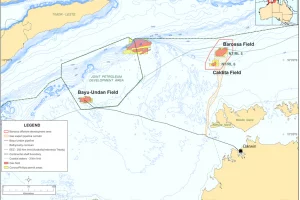Tipakalippa v NOPSEMA sends the development of law into the unknown, and combined with the amendments of the Environment Protection and Biodiversity Conservation (EPBC) Act and the Aboriginal Cultural Heritage Act (ACHA), WA will throw exploration and mining development in Australia into a bureaucratic maze that only those with deep pockets will be able to extract themselves from.
Dennis Tipakalippa, represented by the Environmental Defenders Office, challenged the National Offshore Petroleum Safety and Environmental Management Authority’s (NOPSEMA’s) decision to accept an environmental plan for the Barossa gas field submitted by Santos NA Barossa Pty Ltd. The plan was for the Barossa field pipeline to Darwin, approximately 160 km north of Tiwi Islands. Refer to the image below.
Mr Tipakalippa, a traditional owner belonging to the Munupi clan on the Tiwi Islands, claimed the traditional owner’s connection to ‘sea country’ within the Barossa project area. Therefore, Mr Tipakalippa and his clan should have been directly consulted in relation to the project in accordance with the requirements of the Offshore Petroleum and Greenhouse Gas Storage (Environment) Regulations 2009 (Cth) (Regulations).
The Court agreed with Mr Tipakalippa’s claim, setting aside NOPSEMA’s decision to accept Santo’s environmental plan.
In the appeal decision, the Full Federal Court, in Santos NA Barossa Pty Ltd v Tipakalippa [2022] FCAFC 193, dismissed the challenge to the first decision, and defined what was required for consultation under the Regulations.
The Regulations impose a duty to consult, and the titleholder to demonstrate they consulted with everyone whose interest is affected. Santos failed to provide evidence it consulted all the appropriate stakeholders, in particular the Tiwi islanders who had ‘sea country’ in the area.
The Court said Santos should have:
- given all stakeholders “sufficient information to allow [for]… an informed assessment of the possible consequences” of the proposed activity on their “functions, interests or activities”;
- “be genuine” by giving reasonable time to understand the effect on their interest; and
- “adopt appropriate measures in response to the concerns conveyed to the titleholder”
The court posited that because Australia’s other legislation protected traditional owners non-legal interest, it should occur in this instance and protect the ‘sea country’ claimed by the traditional owners.
The Federal Court set a precedent that the traditional owner’s cultural connection to the sea can be recognised in the absence of legislated legal rights or interest (eg Native Title) when those interests are possibly impacted.
This decision will have wide-reaching repercussions for offshore and onshore projects where the traditional owners can show ‘sea country’ or possibly even ‘country’, is affected.
A possible flow on from this decision is that genuine and informed consultation will be required for all projects assessed under the EPBC Act especially since the Albanese government is expanding the reach of the EPBC Act (see Nature Positive Plan), which includes traditional owner’s engagement and participation in decision-making.
I have no doubt the precedent set by this decision will affect WA’s Environmental Protection Act, and the new Aboriginal Cultural Heritage Act 2021.
Therefore, in the future companies when dealing with traditional owners will need to refine their current consultation process to reduce risk and liability by:
- Identifying all stakeholders, including those traditional owners that don’t have a Native Title Claim;
- Fully inform all the stakeholders;
- Provide adequate responses to the stakeholder’s queries;
- Undertake ‘genuine’ consultation, as defined by the Federal Court; and
- Those undertaking consultation need to systematically document their contact with the stakeholders, so evidences of consultation can be provided if needed.
The last point is one of the problems Santos had in not being able to provide evidential proof of its contact with traditional owners.
Watch very carefully the development of the law set by this case as it sets new ground for those who are deemed stakeholders, and just because a traditional owner does not have a Native Claim does not mean they are not a stakeholder.
As the landscape changes, it is vital to your company that those involved in the interpretation of agreements have an understanding of the law and what it means in Native Title agreements, as well as other exploration agreements.
LandTrack Systems offers WA’s only training for non-lawyers that breaks down the various agreements that come across the desk of exploration and mining companies. Find more info here and register the May training session here.

